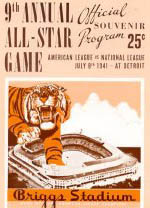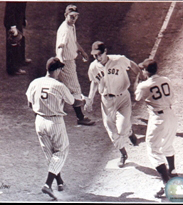 |
Golden Moments in Sports History All
Star Game: Tuesday, July 8, 1941 |
 |
The ninth major league All Star game ranks as one of the most famous and exciting. With Pearl Harbor almost exactly five months later, this was the last mid-summer classic before World War II wreaked havoc on baseball for four seasons. The American League held a 5-3 edge for the first eight contests but had lost 4-0 the year before at Sportsman's Park in St. Louis.
The pennant races looked like this at the three-day All Star break.
American
League |
National
League |
|||||||
| Team | W |
L |
GB |
Team | W |
L |
GB |
|
| New York Yankees | 48 |
26 |
-- |
Brooklyn Dodgers | 50 |
24 |
-- |
|
| Cleveland Indians | 46 |
31 |
3.5 |
St. Louis Cardinals | 48 |
28 |
3 |
|
| Boston Red Sox | 40 |
33 |
7.5 |
New York Giants | 39 |
32 |
9.5 |
|
| Chicago White Sox | 38 |
36 |
10 |
Cincinnati Reds | 39 |
35 |
11 |
|
| Detroit Tigers | 39 |
40 |
11.5 |
Pittsburgh Pirates | 33 |
35 |
14 |
|
| Philadelphia A's | 34 |
40 |
14 |
Chicago Cubs | 34 |
42 |
17 |
|
| St. Louis Browns | 27 |
45 |
20 |
Boston Braves | 29 |
42 |
19.5 |
|
| Washington Senators | 26 |
47 |
21.5 |
Philadelphia Phillies | 20 |
54 |
30 |
|
As is still done today, the managers for the All Star squads were the skippers of the previous season's pennant winners. So that was Del Baker of the Detroit and Cincinnati's Bill McKechnie. As the standings show, neither team was doing well in 1941.
Two American League players were the talk of baseball at the midway point of the season.
- 26-year old Joe DiMaggio of the Yankees had a 48-game hitting streak, which had already broken the major league record of 44 games by Willie Keeler in 1898.
- 23-year old Ted Williams of the Red Sox was hitting .406 as he strove to become the first major-leaguer to hit .400 since Bill Terry of the Giants in 1930 and the first AL hitter since the Tigers' Harry Heilmann in 1923.
The starting lineups, as voted by the fans with the pitchers and reserves selected by the managers:
| National
League |
Batting Order |
American
League |
||||
Player |
Pos. |
Team |
Player |
Pos. |
Team |
|
| Stan Hack | 3B |
Chicago Cubs | 1 |
Bobby Doerr | 2B |
Boston Red Sox |
| Terry Moore | LF |
St. Louis Cardinals | 2 |
Cecil Travis | 3B |
Washington Senators |
| Pete Reiser | CF |
Brooklyn Dodgers | 3 |
Joe DiMaggio | CF |
New York Yankees |
| Johnny Mize | 1B |
St. Louis Cardinals | 4 |
Ted Williams | LF |
Boston Red Sox |
| Bill Nicholson | RF |
Chicago Cubs | 5 |
Jeff Heath | RF |
Cleveland Indians |
| Arky Vaughn | SS |
Pittsburgh Pirates | 6 |
Joe Cronin | SS |
Boston Red Sox |
| Lonny Frey | 2B |
Cincinnati Reds | 7 |
Rudy York | 1B |
Detroit Tigers |
| Mickey Owen | C |
Brooklyn Dodgers | 8 |
Bill Dickey | C |
New York Yankees |
| Whitlow Wyatt | P |
Brooklyn Dodgers | 9 |
Bob Feller | P |
Cleveland Indians |
Detroit fans were happy to have Rudy York in the lineup but missed perennial All Star and the game's highest-paid player, Hank Greenberg, who had been the first major leaguer inducted into the Army on May 7.
Pitching dominated the first six innings. Wyatt pitched two scoreless innings, then Cincinnati's Paul Derringer allowed a run in his two frames when Williams' drive was misplayed into a double. Then another Red, Bucky Walters, gave up another run in the 6th on a single by Lou Boudreau after two walks. Meanwhile, Feller pitched three scoreless innings, giving up one hit while striking out four. Then Thornton Lee of the White Sox pitched the middle three, allowing only one tally on a SF by Moore.
The hitters erupted in the final three innings. The NL forged ahead in the top of the 7th on a two-run homer by Vaughn off Sid Hudson of the Senators, then added two more in the 8th on another Vaughn homer against Eddie Smith of the White Sox. The AL tallied a run in the eighth off Claude Passeau of the Cubs when Boston's Dom DiMaggio singled in his brother Joe, who had doubled. If there had been an All Star MVP in those days (the award didn't begin until 1962), Vaughn would have won hands down at this point. But as Yogi Berra later said, "It ain't over 'til it's over."
In an era when the term "closer" had not been invented, Passeau returned to the mound to protect a 5-3 lead in the bottom of the ninth. He got Frankie Hayes (A's catcher) to popout but Ken Keltner (Cleveland 3B) singled off the chest of the Braves' Eddie Miller, who had just replaced Vaughn at SS. Joe Gordon (New York 2B) singled Keltner to second. Travis walked to load the bases. DiMaggio came up with a chance to be the hero but forced Travis at second for the second out as Keltner scored. This brought up Williams. On a 2-1 pitch, he homered against the right field roof to win the game 7-5. Watch a video of the winning homer and notice Ted's excitement as he rounds the bases.
Afterward, the hero said, "I've never been so happy. Halfway down to first, seeing that ball going out, I stopped running and started leaping and jumping and clapping my hands, and I was so happy I laughed out loud." (Another video about Williams)
Additional Facts
- The All Star game would be held one more time at "Briggs Stadium" (1951) and then at "Tiger Stadium" (1971) – same park, different name. Comerica Park, the Tigers' new ballyard, hosted the 2005 game.
- 19 future Hall-of-Famers were on the rosters for the 1941 contest:
- Nationals 9: Billy Herman, Carl Hubbell, Al Lopez (inducted as a manager), Bill McKechnie (manager), "Ducky" Medwick, Johnny Mize, Mel Ott, Enos Slaughter, Arky Vaughan
- Americans 10: Luke Appling, Lou Boudreau, Joe Cronin, Bill Dickey, Joe DiMaggio, Bobby Doerr, Bob Feller, Jimmy Foxx, Red Ruffing, Ted Williams
- DiMaggio, of course, extended his hitting streak for eight more games before being stopped in Cleveland. He then hit safely in 16 more games in a row for an amazing span of 72 out of 73 games with a hit. When Joe was 19 and playing his first year of professional ball for San Francisco of the Pacific Coast League, he hit safely in 61 straight games.
- Williams ended the 1941 season with a .406 average, the last man to top .400 in the major leagues.